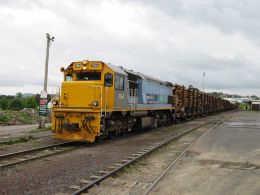Posted 6th May 2008 | 2 Comments
New Zealand buys back its railways

New Zealand freight train
THE New Zealand government—whose railway privatisation in 1993 influenced the Conservative plans in Britain for selling off rail operations—is re-nationalising its TranzRail train and ferry services.
The cost of buying back the rail and Cook Strait ferry assets of operating company Toll New Zealand is put at $NZ665 million (£265 million) — reportedly about three times the value of Toll’s original takeover bid.
Finance Minister Dr Michael Cullen warned that further investment will be required to achieve the government's aim of improving rail link-ups with major ports to reduce the amount of freight transported by road.
Overhauls of passenger services were also needed and while the New Zealand government was still working on the figures, Dr Cullen said “obviously that will be measured in the hundreds of millions rather than tens of millions.”
Negotiations with Toll had been under way for three months and Dr Cullen said $NZ665 million was more than his government wanted to pay, but less than Toll had wanted for the deal.
As Toll's share price rose 35 cents to $NZ8.38, managing director Paul Little said the company did not decide to dispose of TranzRail: “We accepted the offer from the Government but if we had a preference we would have decided not to have sold it.”
Prime Minister Helen Clark said: “Modernising our transport sector is central to transforming our economy and making it truly sustainable.
“With rising fuel prices and growing awareness about the challenge of global climate change, many nations are looking to rail as a central part of 21st century economic infrastructure.
“A modern rail system can lessen the carbon footprint of our wider transportation network, taking pressure off our roads and allowing our trucking and shipping businesses to operate more efficiently.”
The New Zealand government takes over on 1 July, with senior Toll staff contracted to stay for a transition period until February next year.
Rolling stock will be owned either by a new state-owned enterprise or in a separate entity within Ontrack—the government-owned equivalent of Britain’s Network Rail.
Recent history
The railways in New Zealand were sold in 1993 to a consortium called TranzRail, led by the US-based Wisconsin Central Railroad.
In Britain, at the same time, British Rail’s trainload freight operations had been broken into three companies in readiness for privatisation.
But there was little interest in these individual companies and the Conservative government finally invited the Wisconsin-led New Zealand consortium to bid for all three, as well as Rail Express Systems (RES).
As a result, EWS Railway was created in March 1996, and a year later also took over BR’s Railfreight Distribution division.
EWS was bought by German state railway, DB, late last year.
In New Zealand , the government had been trying to negotiate agreed fees since 2003 with the Australian-owned Toll company for access to rail lines, which are now owned by Ontrack.
“The selling off our public rail system in the early 1990s and the running down of the asset afterwards has been a painful lesson for New Zealand,” Finance Minister Dr Cullen said.
“During the [recent] negotiations with Toll it transpired that buying [back] the rail operating business including the ferries was the best way to increase investment in the industry and enable it to be more responsive to the needs of New Zealand customers.
“Running a commercially viable business that was able to contribute to the economic and environmental development of New Zealand was proving extremely difficult without government support.”
He added: “In the months ahead, I will explore options for significant investments in new, modern rolling stock. These will be presented to Cabinet and full details will be made available as soon as possible.”
Reader Comments:
Views expressed in submitted comments are that of the author, and not necessarily shared by Railnews.

Scott Wigston, Horden Colliery, England United Kingdom
Britain's privatised rail network was a disaster and shortcomings by the erstwhile British Rail pale into insignificance in comparison. The government has brought Railtrack/Network rail back into public ownership and should go the whole mile and do the rest.
Britain's privatised and deregulated bus network should be next in line. The cities and towns should run their own transort systems as was the case. It is frustrating buying tickets only to find that they are invalid when a different bus company turns up, to the one advertised on the bus stop board.
Geoff Steel, Northampton, UK
This is exactly what our present government should have done. Instead it has allowed huge amounts of money to be wasted in lining the pockets of profit seeking companies. This money could have been invested in our infrastructure and trains rather than paying shareholders dividends. Even the Tories seem to accept that privatising the railways failed to achieve the original objectives of reducing the burden on the pubic purse and introducing competition.
If Gordon Brown wants to win the next election he would certainly regain a lot of support by following Helen Clark's lead and stop this money train in its tracks and bring the whole business back to where it belongs. A public service run by the public for the public